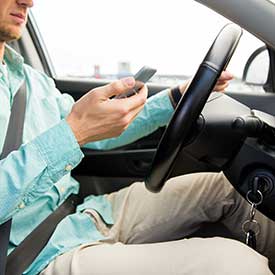
Pay Attention, Texas: Observing Distracted Driving Awareness Month
- April 2
- EVANS / DESHAZO / REILLEY
- Car Accidents Personal Injury Wrongful Death
April is Distracted Driving Awareness Month
As the EVANS / DESHAZO / REILLEY Law Firm and the National Safety Council observe Distracted Driving Awareness Month in April, help us by doing your part to keep Texas roads safe.
Distracted driving is nothing new. People have been eating, touching up makeup, and fiddling with the radio dial while behind the wheel since long before cell phones became part of the equation.
But as much as advancements in technology have improved our lives and ability to communicate, they haven’t done many favors for our driving. In addition to all of the old-school distractions, we now have dashboard touch-screens, GPS devices, and those ever-present smartphones to tempt our eyes away from the road.
Don’t endanger yourself, your family, and your fellow citizens. Join us in taking the National Safety Council’s pledge to Just Drive.
Distracted Driving Leads to Accident, Injury, and Death
According to the National Highway Traffic Safety Administration (NHTSA), sending or reading a text requires that you take your eyes off the road for five seconds. That may not seem like a long time, but at 55 mph, that’s the entire length of a football field.
Not surprisingly, accident statistics confirm that driving while distracted is downright dangerous.
- At least nine Americans die and about 100 are injured every day in car accidents caused by a distracted driver.
- In 2016, 3,450 people died in distracted-driving-related accidents.
- In 2015, 391,000 injuries were attributable to distracted driving.
- In a series of experiments by Car and Driver magazine (as reported in the Los Angeles Times), texting and reading emails resulted in slower reaction times in drivers than did a blood alcohol content of .08.
- Young drivers are especially susceptible to the dangers of distracted driving. While dialing a cell phone doubles the risk an experienced adult will crash (or have a near-miss), for a teen the risk increases eight-fold.
- Hands-free devices are not the answer. Drivers who are mentally focused on a phone conversation have a decreased ability to process moving images even if they are looking out the windshield.
Do Your Part. Drive Safely.
Texas has implemented some measures designed to make our state’s roads safer.
- Texting and emailing while driving are illegal.
- Drivers who have learner’s permits may not use handheld cell phones in their first six months of driving.
- It’s against the law for drivers younger than 18 to use wireless communication devices.
- School bus drivers may not use cell phones when driving children.
- Texting and handheld devices are prohibited for all drivers in school zones.
- Many areas have passed stricter ordinances, so it’s important that you know the rules in your city or municipality.
Distracted Driving Awareness
If you want to be the safest driver possible, go beyond the letter of the law. Avoid using your phone, period, even with a bluetooth device. Don’t call or text someone if you have reason to believe they may be driving. Refrain from snapping selfies or taking videos. Program your GPS before the car is in motion. And don’t engage in any other activity that could hijack your attention while driving.

 Serving Clients Throughout Texas
Serving Clients Throughout Texas
 Chip Evans is a partner at Evans & Herlihy. Chip brings to the firm more than 20 years of experience as a trial lawyer representing Plaintiffs. It is the desire to help individuals, not corporations, that attracts Chip to this side of the docket. [
Chip Evans is a partner at Evans & Herlihy. Chip brings to the firm more than 20 years of experience as a trial lawyer representing Plaintiffs. It is the desire to help individuals, not corporations, that attracts Chip to this side of the docket. [